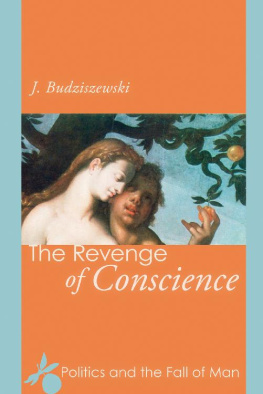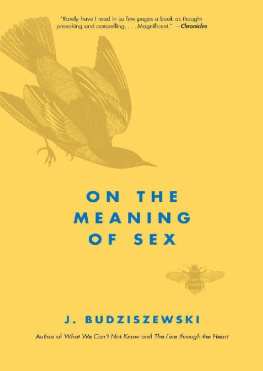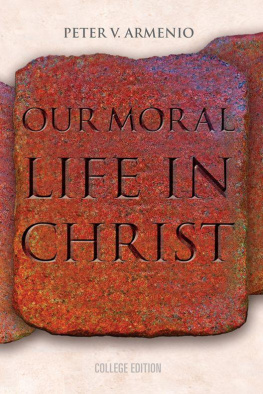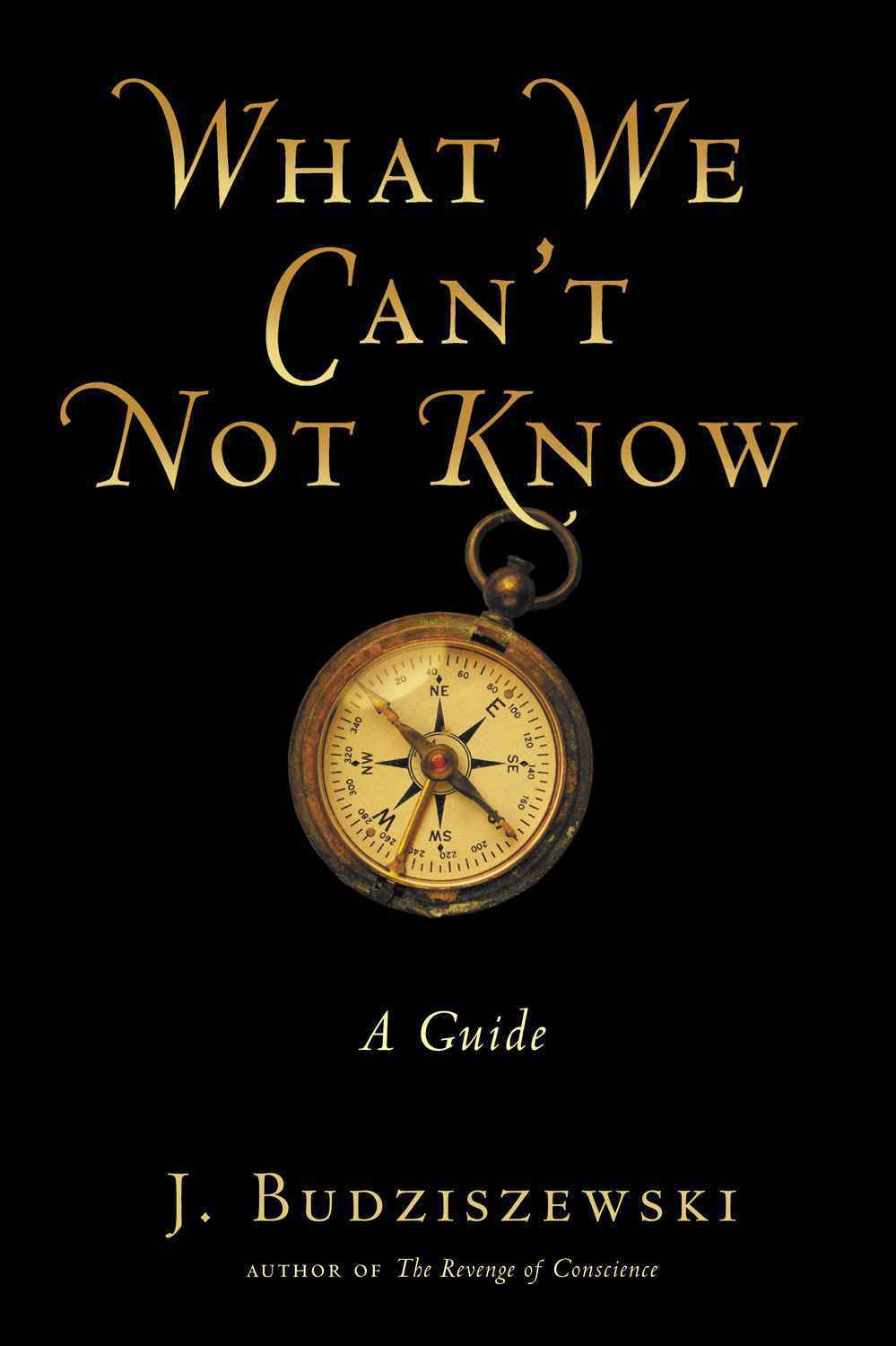WHAT WE CANT NOT KNOW
J. BUDZISZEWSKI
WHAT WE CANT
NOT KNOW
A Guide
Revised and Expanded Edition
IGNATIUS PRESS SAN FRANCISCO
First edition published by
Spence Publishing Company, Dallas, Texas
2003 by J. Budziszewski
All rights reserved
Cover illustration: Comstock/Fotosearch.com
Cover design by Sam Torode
2004 Spence Publishing Company
Used by permission
Published in 2011 by Ignatius Press, San Francisco 2003, 2011 J. Budziszewski
All rights reserved
ISBN 978-1-58617-481-1
Library of Congress Control Number 2010927673
Printed in the United States of America
To my grandparents
Julian and Janina Budziszewski,
long departed,
not forgotten
The mind of man is the product of live Law; it thinks by law, it dwells in the midst of law, it gathers from law its growth; with law, therefore, can it alone work to any result .
George MacDonald
CONTENTS
A New Phase of an Old Tradition
Whom This Book Is For
The Moral Common Ground
THE LOST WORLD
EXPLAINING THE LOST WORLD
HOW THE LOST WORLD WAS LOST
RECOVERING THE LOST WORLD
PREFACE TO THE SECOND EDITION
A New Phase of an Old Tradition
How what we hold in common is related
to what we do not hold in common .
D uring the eight years since the first edition was published, a shift that had already been going on among natural law thinkers has gained ever-greater clarity and momentum. The book reflected that change: although I was appealing to the common sense of the plain man, to the ethical patrimony of the whole human race, I made no attempt to write as a generic person whose intellectual traditions and faith community made no difference. In fact I called attention to these thingsnot, as I said, to shut others out of the conversation, but to invite them in.
That might have seemed a strange way to extend an invitation to dialogue. In order to talk about what we have in common, shouldnt we bracket our differences? In order to touch what is universal, dont we have to suppress everything that isnt? Well, no. Why not? At various points in the first editionfor example, in commenting on the link between nature and tradition, between virtue and vision, and between deep conscience, which does not vary, and surface conscience, which doesI certainly gave reasons. What I didnt explain is how different this approach to natural law may seem from other ways of thinking about it. In other words, although the book reflected a shift in the understanding of natural law, it didnt explicitly discuss the shift. This new edition provides an opportunity to do so.
Speaking in the broadest possible terms, the natural law tradition has passed through three historical phases and is now entering the fourth.
Phase one belonged to the philosophers. Ancient thinkers like Aristotle discovered that beings have natures, and tried to develop intellectual tools for thinking about them. Other thinkers, especially the Stoicsalthough this idea is present in embryo in Aristotle toosuggested that the principles of these natures could be expressed in terms of laws, real laws, which were somehow the work of the divine mind.
Phase two belonged to the theologians. Jewish thinkers worked out the implications of the ancient tradition that before God gave the Torah to the sons or descendants of Abraham, He had already given commandments to the sons of Noah, which means to the whole human race. Islamic thinkers of the now much less influential Mutazilite school maintained that good and evil are embedded in things, in the structures of creation. Christian thinkers explicitly appropriated the whole philosophical tradition. As Joseph Cardinal Ratzinger suggested before his accession to the papacy, in the early days of Christianity, in an environment teeming with gods, when believers were asked to which god their God corresponded, the answer ran: to none of them. To none of the gods to whom you pray but solely and alone to him to whom you do not pray, to that highest being of whom your philosophers speak. He rightly remarks, The choice thus made meant opting for the logos as against any kind of myth, In the natural law, the power, love, and wisdom of this God were united, and in the grace of Christ the capacity to follow it was restored. Here I must repeat another point from the first edition: although the thinkers of these faith communities were mindful of their traditions, they were not hermetically sealed from each other. It was no accident that the period during which the thinkers of my faith achieved their greatest insights into natural law coincided with the period during which they were intensely and simultaneously engaged with the pagan thought of Aristotle, the Jewish thought of Maimonides, and the Muslim thought of Averros.
Phase three was dominated by the thinkers of the Enlightenment. For various reasonsin some cases religious skepticism, in others fear of religious warsthey tried to sever the connections between religion and philosophy, between faith and reason. Their aim was to make natural law theory theologically neutral a body of axioms and theorems that any intelligent, informed mind would consider obvious once they were properly presented, in fact equally obvious no matter what religion or wisdom tradition the mind followed, or whether it followed any at all. It wasnt that the Enlightenment thinkers didnt believe in God. Although some were atheists, others were Christians, of a sort. The problem was somewhat different, and it was twofold.
In the first place, they thought that one could know all the important things about man even while knowing very few of the important things about God. It was enough to work out His existence as a theorem; there was no further need to know His name, the history of His self-disclosure, His mighty deeds in history. In one way this was a regression to the Unknown God of the Athenians, to the pure Being or pure thought, circling round for ever closed in upon itself without reaching over to man and his little world. Yet like all apparent regressions, in another way it was not that at all; whenever we try to return to an earlier stage and reject what we have learned since then, we lose what we had then too. The problem with the Athenians was simple ignorance; they had never heard about agape . The problem with the thinkers of the Enlightenment was rejection; they had heard about agape but decided that it wasnt important. This was a kind of intellectual blindness, and it was progressive. Having lost their grip on agape, they came to lose their grasp on the logos too. Consequently, they felt a greater and greater need to make natural law theory to be not only theologically neutral but even ontologically neutral, independent of anything else that might be important. And this was impossible. In the second place, they thought that the ability of the mind to grasp the truth about man was independent of moral virtue. To put it another way, ethics was like mathematics. A scoundrel ought to grasp the virtue of purity just as easily as he grasped the Pythagorean theoremand if he couldnt, well, then perhaps that showed it simply wasnt a virtue. Needless to say, this had a certain flattening effect on moral philosophy.
The reason we are entering a fourth phase is that the Enlightenment project collapsed. Modern man lost confidence in the possibility of an ethics that was both universal and yet somehow neutral. Some, relativists, retained the idea of ethics but abandoned the idea of universality; they thought each group has its own right and wrong. This reduces statecraft to sheer power, because someones right and wrong has to win and there is no way to arbitrate among them. Others, liberals, retained the idea of neutrality but abandoned the idea of ethics. They came to insist that the laws of the state must be justified in a way that is independent not only of theology and ontology, but of ones conception of the good. Because this is impossible, what happens in practice is that their own views of the good prevail without challenge, just by pretending that they arent really views of the good.






